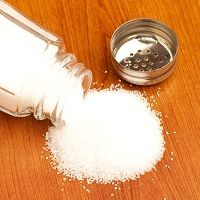Article
High-Salt Diet May Lead to Multiple Sclerosis Onset
Author(s):
High-sodium diets could be a risk factor for multiple sclerosis (MS) in addition to genetic predisposition and additional factors, according to research published in The FASEB Journal.

Researchers from University of Vermont designed a diet in three genetically different groups of mice in order to demonstrate that high levels of dietary sodium exacerbate the onset of MS in female animal models. The researchers gave either a high-salt diet or a control diet to the sets of mice for observation. Previous research has demonstrated that MS is increasingly more common in females, with MS incidence among women tripling in the last century. Further studies have shown that dietary sodium is a risk factor for MS, in that high sodium changed the generation of T helper 17 cells and exacerbated the mice model of MS, called encephalomyelitis (EAE). However, the researchers highlighted that whether dietary sodium interacts with sex or genetics is still unknown.
“We hope to provide a comprehensive understanding of how and why environmental factors interact with individuals’ unique genetic make up to influence autoimmune diseases such as MS,” explained Dimitry N. Krementsov, PhD, a researcher involved in the work from the Department of Medicine, Immunobiology Program at the University of Vermont in Burlington, Vermont.
The researchers demonstrated the ability of a high sodium diet to effect EAE onset in a strain- and sex-specific fashion. In one of the genetic groups, both male and female mice which were fed a high-salt diet demonstrated worse clinical signs of MS. In another genetic group, only the females had a negative reaction to the high-salt diet. The third genetic mice group demonstrated no observable response to the high-salt diet.
In the mice that did respond to the high-salt diet, the researchers reported, there were no direct changes in the function of their immune cells. However, those mice did show symptoms of an increasingly permeable blood brain barrier and brain pathology.
“As is the case with other things, you need to get enough salt so your body functions properly, but not too much or things start to go haywire,” said Gerald Weissmann, MD, editor in chief of The FASEB Journal. “This report helps shed light on what can go wrong in individuals with genes that make one susceptible to autoimmune disease. It also helps us understand how much salt is just right for any given individual.”
The researchers concluded that their results indicate the effects of dietary sodium on autoimmune neuroinflation are sex-specific, genetically controlled, and CNS-mediated.





